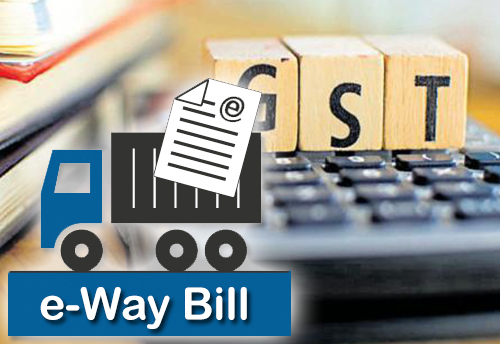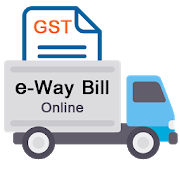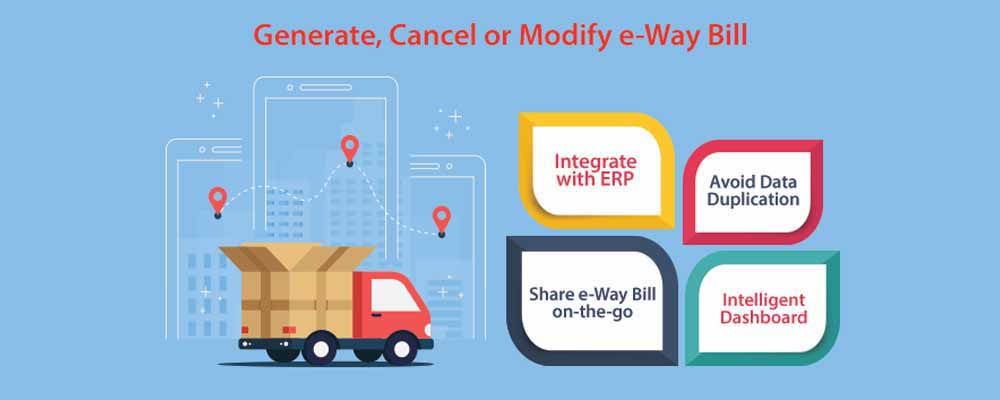E-way bill (FORM GST EWB-01)

E-way bill (FORM GST EWB-01) is an electronic document (available to supplier / recipient / transporter) generated on the common portal evidencing movement of goods of consignment value more than Rs. 50000/-. It has two Components-Part A comprising of details of GSTIN of supplier & recipient, place of delivery (indicating PIN Code also), document (Tax invoice, Bill of Supply, Delivery Challan or Bill of Entry) number and date, value of goods, HSN code, and reasons for transportation; and Part B –comprising of transport details - transport document number (Goods Receipt Number or Railway Receipt Number or Airway Bill Number or Bill of Lading Number) and Vehicle number for road.
prior to the commencement of movement of goods" and "is to be issued whether the movement is in relation to a supply or for reasons other than supply"
Who should generate the e-way bill and why?
E-way bill is to be generated by the consignor or consignee himself if the transportation is being done in own/hired conveyance or by railways by air or by Vessel. If the goods are handed over to a transporter for transportation by road, E-way bill is to be generated by the Transporter.
1. Where the value of goods is more than Rs.50, 000/- it shall be the responsibility of the transporter to generate it.
2. It has been provided that where goods are sent by a principal located in one State to a job worker located in any other State. Irrespective of the value of the consignment.
3. Where handicraft goods are transported from one State to another by a person who has been exempted from the requirement of obtaining registration irrespective of the value of the consignment.
Cancellation of E-Way Bill
Where an e-way bill has been generated under this rule, but goods are either not transported or are not transported as per the details furnished in the e-way bill, the e-way bill may be cancelled electronically on the common portal, either directly or through a Facilitation Centre. within 24 hours of generation of the e-way bill. However, an e-way bill cannot be cancelled if it has been verified in transit.
Exceptions to e-way bill requirement
No e-way bill is required to be generated in the following cases

a) Transport of goods as specified in Annexure to Rule 138 of the CGST Rules, 2017
b) Goods being transported by a non-motorised conveyance;
c) goods being transported from the port, airport, air cargo complex and land customs station to an inland container depot or a container freight station for clearance by Customs;
d) In respect of movement of goods within such areas as are notified under rule 138(14) (d) of the SGST Rules, 2017 of the concerned State; and
e) Consignment value less than Rs. 50,000/-
(f) Where the goods being transported are alcoholic liquor for human consumption, petroleum crude, high speed diesel, motor spirit (commonly known as petrol), and natural gas or aviation turbine fuel
(g) Where the goods being transported are treated as no supply under Schedule III of the Act.
Relaxation if goods transported from place of consignor to transporter and distance less than 10 Km
| Validity of eWay Bill |
| Type of conveyance |
Distance |
Distance Validity of EWB |
| Other than Over dimensional cargo |
Less Than 100 Kms |
1 Day |
| For every additional 100 Kms or part thereof |
additional 1 Day |
| For Over dimensional cargo |
Less Than 20 Kms |
1 Day |
| For every additional 20 Kms or part thereof |
additional 1 Day |
Validity of Eway bill can be extended also. before expiry or within four hours after its expiry can extend Eway bill
Documents required to generate eWay Bill
Invoice/ Bill of Supply/ Challan related to the consignment of goods
Transport by road – Transporter id or Vehicle number
Transport by rail, air, or ship – Transporter ID, Transport document number, and date on the document
Consequences of non-conformance to E-way bill rules
A taxable person who transports any taxable goods without the cover of specified documents (e-way bill is one of the specified documents) shall be liable to a penalty of Rs.10,000/- or tax sought to be evaded (wherever applicable) whichever is greater.
In following cases, e-way bill should be generated irrespective of value
E-way bill should be generated irrespective of value of consignment i.e. even if value of consignment is below Rs 50,000 –
(a) Sending material inter-State for job work
(b) Handicraft goods transported inter-State under exemption if turnover of person below Rs. 20/10 lakhs and enjoying exemption under Notification No. 32/2017-CT, dated 15-9-2017
Read More →
Penalty if transporter fails to generate an e-way bill
If the supplier for some reason fails to create the e-way bill, then it is the responsibility of the transporter to obtain it. if the transporter fails to do same then he/she may face the Penalty of a Rs.10,000 fine or tax assumed to be avoided. He/she is further liable for the confiscation of goods and seizure of the vehicle.
Who all can generate the e-way bill?
Every registered person who causes movement of goods of consignment value exceeding fifty thousand rupees in relation to supply; or reasons other than supply; or inward supply from unregistered person shall generate e-way bill. It means, the consignor or consignee, as a registered person or a transporter of the goods can generate the e-way bill. The unregistered transporter can enroll on the common portal and generate the e-way bill for movement of goods for his clients. Any person can also enroll and generate the e-way bill for movement of goods for his/her own use.
Who all can update the vehicle number for the e-way bill?
The e-way bill is not valid without the vehicle number updated on the common portal, if on the mode of transport is the road. The Vehicle number can be updated by the generator of the e-way bill or the transporter assigned for that e-way bill by the generator.
Can I transport the goods with the e-way bill without vehicle details in it?
No. One needs to transport the goods with a e-way bill specifying the vehicle number, which is a carrying the goods. However, where the goods are transported for a distance of less than ten kilometers within the State from the place of business of consignor to the place of transporter for further transportation, then the vehicle number is a not mandatory.
Whether an e-way bill is to be issued, even when there is no supply?
Yes. Even if the movement of goods is caused due to reasons others than supply, the e-way bill is required to be issued. Reasons other than supply include movement of goods due to job-work, replacement under warranty, recipient not known, supply of liquid gas where quantity is not known, supply returns, exhibition or fairs, for own use, Sale on approval basis and others etc.
Is there any time gap allowed between furnishing information in Part-A and updating transport details in Part-B?
On furnishing of Part-A, a unique number will be generated on the portal which shall be valid for 72 hours for updating of Part B of FORM GST EWB-01.
How does transporter come to know that particular e-way bill has been assigned to him?
The transporter comes to know the EWBs assigned to him by the taxpayers for transportation, in one of the following ways: The transporter can go to reports section and select ‘EWB assigned to me for trans’ and see the list. The transporter can go to ‘Update Vehicle No’ and select ‘Generator GSTIN’ option and enter taxpayer GSTIN, who has assigned or likely to assign the EWBs to him. The tax payer can contact and inform the transporter that the particular EWB is assigned to him
Can a e-way bill be modified?
No. Part-A of an e-way bill once generated, cannot be modified. However, Part-B can be updated as many times as the transport vehicle is changed within the overall validity period. The validity period is not changed when the Part-B is updated.
Who can reject the e-way bill and Why?
The person who causes transport of goods shall generate the e-way bill specifying the details of other person as a recipient of goods. There is a provision in the common portal for the other party to see the e-way bill generated against his/her GSTIN. As the other party, one can communicate the acceptance or rejection of such consignment specified in the e-way bill. If the acceptance or rejection is not communicated within 72 hours from the time of generation of e-way Bill, it is deemed that he has accepted the details.
What are the modes of e-way bill generation, the taxpayer can use?
The e-way bill can be generated by the registered person in any of the following methods;- o Using Web based system o Using SMS based facility o Using Android App o Using Site-to-Site integration o Using GSP ( Goods and Services Tax Suvidha Provider)
Consolidated E-way Bills
A consolidated E-way bill is the document which contains multiple e-way bills for a single transport carrying several shipments. The transporter carrying the multiple consignments can generate the consolidated e-way bill.
What happens if Consignment is Rejected?
In some circumstances, for several reasons, the recipient may reject the shipment. In such instances, the transporter can generate a new e-way bill for “Sales Return”, with the help of the recipient to return the goods to the supplier with all related documents.
In the absence of physical restrictions on movement of goods, some control is essential to ensure that goods are not clandestinely removed and sold. Karnataka, Rajasthan and Uttarakhand are examples of states that have already started complying with E-Way Bill requirements. Their successful implementation is a positive sign. However, it is important for the government to pacify the nervousness in the industry by ensuring a robust IT backbone, which will improve the ease of doing business
Show Less




